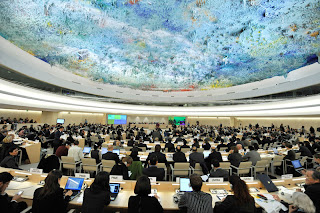 |
| The main chambers of the United Nations Human Rights Council |
We’ve all been there: you’re immersed in
another culture—either physically or conversationally—and you find yourself
putting more thought into your words than usual. You don’t want to offend
anyone, and you hope no one says anything that you yourself would find
offensive. For the most part, this kind of cross-cultural communication can serve to build mutual understanding and trust, but oftentimes there’s that awkward
feeling of self-censorship we impose because of who’s in our
company. As awkward as that may feel, it’s a good kind of awkward, one that
makes you more reflective about word choice, mannerisms and idiosyncrasies that
might put off others who grew up with vastly different cultural practices and guided by diverse value systems. Feel free to break free from the social and cultural norms, or to
utter a phrase you know your counterpart will revile, but don’t be surprised if you get more than a few dirty looks.
At its core, this self-censorship is a sign of respect for others, not fear. This is a crucial distinction, because the mindfulness comes from surveillance by other individuals with (in tolerant societies) only social consequences. But with the advent of advancing technologies in information sharing and communication on a scale never seen before, our thoughts and feelings have the potential to attract a global audience; just go on YouTube. Looking at recent news concerning the National Security Agency's (NSA) PRISM spying apparatus, our human expressions are increasingly subject to state, not just individual, surveillance. Dozens of governments across the world monitor their citizens' cell phone and internet activity. A lot of the time, states further expand their intelligence gathering through practices like wire-tapping.
Even though it may seem governments overextend their surveillance powers, people generally accept that covert data collection in almost all circumstances is a necessary component of national security in the digital age. There is certainly reason behind this. As I wrote in a past article for The Global Atlas, terrorist organizations use the Internet and cell phones just like
everyone else to coordinate their activities. Organized crime is another area where state surveillance should be employed. But the problem with the size and scope of state surveillance of our private lives is the lack of oversight and accountability of these practices. What's to stop a country from trolling your phone records and Internet surfing history if they aren't party to any human rights treaties (see below) and have no domestic legislation specifying the appropriate amount and types of information that can be collected?
On June 4th, the UN Special Rapporteur on the promotion and protection of the right to freedom of opinion and expression, Frank La
Rue, issued a landmark report on the link between our fundamental human rights of freedom of opinion, expression and privacy and the growing phenomenon of state surveillance into their citizens' private lives. In his report, La Rue argues a few points. First, he singles out businesses and that they should
not be easily complicit in illegitimated and indiscriminate monitoring, which
puts journalists, human rights defenders and political activists at risk. He
also warns of excessive filtering of comments and ‘offensive language’ on websites, a practice
which sometimes can strongly resemble the eradication of dissent, criticism and activism.
He calls on states and UN bodies to update their practices and regulations to
keep up with new technologies used for increasing surveillance by states, since
these technologies often enable and perhaps encourage violations of our right
to privacy and freedom of expression and opinion. La Rue also asserts state
surveillance of communication severely undermines citizens’ ability to enjoy a
private life, freely express themselves and enjoy other fundamental rights. Importantly,
the report marks the first time that the UN has emphasized the centrality of
the right to privacy to democratic principles and the free flow of speech and
ideas.
Looking back through to the beginning of this article, there is a distinct difference between worrying about offending someone and being paranoid that your own government is collecting 'metadata' about you that gains them access to personal associations and relationships. In apparatuses like PRISM, data content on millions of Americans and others gives the state information on everything from who we are calling, the businesses we frequent and our daily routines. You don't have to 'have nothing to hide' to consider that states should have more limits on how our personal information is being used and tracked. Transparency, oversight and accountability are the best ways to build public trust in these surveillance programs.
For reference, I've outlined below the regional and international principles that safeguard freedom of expression and the right to privacy:
Internationally stated, the right to freedom of expression is guaranteed under:
- Articles 19 of the Universal Declaration of Human Rights (UDHR) and the International Covenant on Civil and Political Rights (ICCPR), which also guarantee the right to hold opinions without interference and to seek, receive, and impart information and ideas of all kinds through any media and regardless of frontiers.
Regionally, freedom of expression is protected by:
- Article 9 of the African Charter on Human and People's Rights
- Article 13 of the American Convention on Human Rights (ACHR)
- Article 10 of the Convention for the Protection of Human Rights and Fundamental Freedoms
The right to privacy, which is the ability of individuals to determine who holds information about them and how that information is used, is proclaimed internationally in:
- Article 12 of the UDHR
- Article 17 of the ICCPR
- Article 16 of the Convention of the Rights of the Child
- Article 14 of the International Convention on the Protection of All Migrant Workers and Members of Their Families
At the regional level, the fundamental human right to privacy is protected under:
- Article 8 of the European Convention on Human Rights (ECHR)
- Article 11 of the ACHR

No comments:
Post a Comment